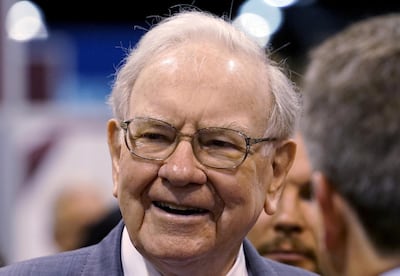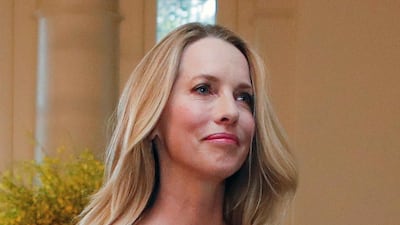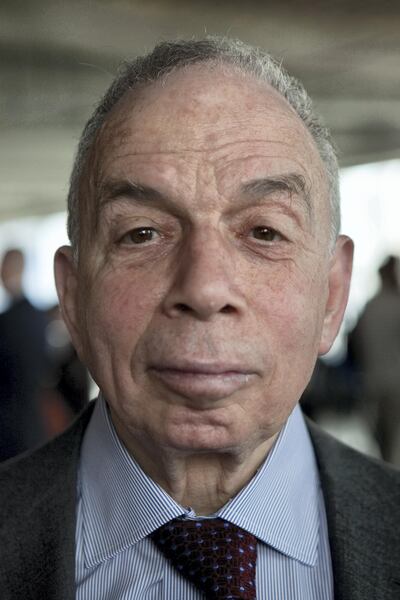Laurene Jobs
Billionaire philanthropist Laurene Jobs is buying about a 20 per cent stake in Monumental Sports and Entertainment, a holding company led by Ted Leonsis that includes the NBA's Washington Wizards, NHL's Capitals and the Capital One Arena.
The investment from Ms Jobs, the founder and president of Emerson Collective, is pending league approvals, according to a statement from Monumental, which did not say how much she paid. Ms Jobs, who was part of a group that unsuccessfully bid on basketball's Los Angeles Clippers, will have the second-largest stake in Monumental behind Mr Leonsis, a former senior executive at AOL.
"That someone of Laurene's impressive calibre is interested in coming into the ownership group further validates that Monumental Sports and Entertainment is continuing to build one of the most consequential, most valuable sports and entertainment companies in the world," Monumental said.
Ms Jobs, 53, has a net worth of US$17.8 billion, making her the world's 54th richest person, according to the Bloomberg Billionaires Index. With the investment, she becomes one of the most powerful women in professional sports, where the ownership ranks are dominated by men. Other female sports team owners include Jeanie Buss of the Los Angeles Lakers, Gail Miller of the Utah Jazz and Ann Walton Kroenke of the Denver Nuggets.
Much of Ms Jobs wealth comes from stock held in Apple, which was co-founded by her late husband, Steve Jobs, who died six years ago.
Her investment comes at a time of ballooning franchise values in professional sports, largely driven by media rights. The Houston Rockets were recently sold for a record $2.2bn, topping what former Microsoft chief executive Steve Ballmer paid for the Clippers. Mr Leonsis has said he wants to make Monumental, whose investments are largely in Washington, a more international brand.

Warren Buffett
Warren Buffett is on familiar ground with his latest deal - down to the banker who brought it to him.
Berkshire Hathaway said on Tuesday that it is buying a minority stake in the closely held company that owns the Pilot Flying J truck-stop chain. Berkshire will become the biggest shareholder in six years, with the Haslam family controlling the remaining 20 per cent.
In building his conglomerate, Buffett has long been attracted to stable industries with cash flows he can predict far out into the future. He also likes family-owned businesses and has been willing to structure deals in a way that allows the seller to retain an interest in the company. That flexibility has helped him be a buyer of choice for many closely held firms, from Nebraska Furniture Mart to toolmaker Iscar.
Pilot is “a very Buffett-like business - family-owned,” said David Rolfe, chief investment officer at Wedgewood Partners, a money manager overseeing about $5.5bn including Berkshire stock. “It’s not going away.”
The deal for Pilot Travel Centers was arranged by Buffett’s favourite banker, Byron Trott, whose BDT Capital Partners is selling shares to Berkshire as part of the transaction. Mr Trott works with multiple billionaire clients to find opportunities, particularly in family-led companies.
Buffett, 87, has turned to Mr Trott for deals before. In 2003, the former Goldman Sachs Group banker helped line up Berkshire’s purchase of McLane, a trucking outfit then-owned by Wal-Mart Stores. A few years later, he brokered Buffett’s purchase of Marmon, a group of manufacturing businesses, from Chicago’s Pritzker family.
Mr Trott “understands Berkshire far better than any investment banker with whom we have talked,” Buffett wrote in a letter to Berkshire shareholders in 2004, “and - it hurts me to say this - earns his fee.”
Mr Trott also played a leading role in facilitating Berkshire’s $5bn investment in Goldman Sachs in September 2008, a capital injection that helped shore up confidence in the firm at a critical juncture.
In more recent years, Buffett and Mr Trott have found fewer opportunities to work together. That’s in part because Berkshire has grown much bigger and it needs to find larger deals to make a meaningful impact on its results.
Still, the latest transaction shows how Buffett continues to tap the rich network of advisers and business partners that he’s cultivated over several decades - especially if it means that he gets an opportunity to invest in companies that others might never see.
While significant, the latest investment may not go far in solving a bigger issue at Berkshire: too much cash. At the end of June, the company had almost $100bn on hand.
“I doubt it’s much of a dent in the cash pile,” said Steve Wallman, a Berkshire investor and fund manager in Middleton, Wisconsin. “My guess is less than $5bn.”
Si Newhouse
Samuel “Si” Newhouse Junior, the publishing billionaire who oversaw some of America’s best-known magazines, including Vogue, the New Yorker, GQ and Vanity Fair as head of the closely held media empire built by his father, died earlier this month at 89.
He died at home, Conde Nast spokeswoman Cameron Blanchard confirmed in an e-mail. No cause was given.
Newhouse was chairman of Advance Publications, which Forbes magazine in 2017 ranked as the 40th-largest private US company, with an estimated $8bn in revenue and 25,000 employees. In four decades at the helm of its magazine unit, Conde Nast Publications, he created new titles, entered markets around the globe and helped re-engineer magazines as thick, glossy periodicals in which paid advertisements seem to complement rather than interrupt the articles.
His father, Samuel Senior, died in 1979 as a self-made media chieftain. He owned 31 newspapers with a total circulation of more than 3 million, plus the Sunday supplement Parade, seven magazines including Vogue and Glamour, radio stations and cable-television systems. In 1971, Syracuse University’s journalism school, acknowledging its main benefactor, was renamed the S.I. Newhouse School of Public Communications.
Newhouse was given control of Vogue and four other women’s magazines in the early 1960s, a reflection of how his father viewed them as “a sideline business,” Thomas Maier wrote in his 1994 book on the family’s media empire. His younger brother, Donald, viewed inside the family as more dedicated to the family company, was put in charge of its newspapers.
Both brothers were among the wealthiest Americans. The Bloomberg Billionaires Index estimated Si’s net worth at $12.7bn, making him the 35th richest person in the US and Donald’s at $11.7bn, ranked 41st in the country. Si was the sixth-richest person in media. Under Si Newhouse, Conde Nast’s magazines moved from sideline to centrepiece.
Newhouse had three children, Samuel, Wynn and Pamela, with his first wife, Jane Franke, whom he had met in college. His second marriage was to Victoria de Ramel, the former wife of a French count. His survivors include his wife; two children, Samuel and Pamela; his brother, Donald; five grandchildren and three great-grandchildren, according to the family statement.
John Gokongwei
Billionaire John Gokongwei oversees an empire spanning airlines, malls and property. Now his family is preparing to drive into online shopping as well.
Robinsons Retail Holdings, one of three giants that dominate retail in the Philippines, has begun moving more of its $2.7bn empire online. The company plans to triple the number of supermarkets that ship web orders by 2018, said Robina Gokongwei-Pe, the tycoon’s daughter and company president. Other parts of the conglomerate, including department stores, will eventually follow.
Robinsons joins SM Investments and Ayala in exploring e-commerce for a country where life revolves around the old-fashioned mall. All three launched online shops or invested in services over the past year, responding to a generation of smartphone-toting consumers exploring alternatives like Alibaba Group Holding Lazada. Soul-crushing traffic congestion - rated among the worst in the world - only accelerates that online migration.
The Gokongweis are quickening their efforts as Alibaba and Amazon.com prepare to battle it out for Southeast Asia, a region of more than 600 million that’s fast embracing online shopping. The family already has a small stake in Sea the Southeast Asian giant preparing a US stock market debut. It’s begun selling appliances and selected fashion online, through partners such as Zalora. But with supermarkets - the primary revenue-driver - Robinsons is making its biggest foray into e-commerce. Online sales through a shopping site launched in May have so far shown promise, Ms Gokongwei-Pe said.
“We’re seeing exponential growth in online retail,” she said. “This is the way to go given the horrible traffic in urban areas like Manila and a growing market of millennials.”
Malls remain a fixture of the Filipino landscape, serving as gathering places, dining venues and even places of worship. But the spread of broadband, plus a growing familiarity with e-commerce, drove double-digit growth in online retailing in 2016, according to Euromonitor International. Smartphone penetration is seen reaching 180 per cent this year - meaning most people have two phones - while internet subscribers are projected to approach 32 million in 2018, it said.
The country is a latecomer to the Asian online shopping scene, lagging much of the region from Malaysia to Singapore - Lazada’s home base and now also Amazon’s first Southeast Asian market. Only half a per cent of Philippine retail sales took place online in 2015, but that could rise to $9.7bn or 4.7 per cent of the total by 2025, according to a report by Google and Temasek. On Monday, Lazada said it’ll begin selling select merchandise from Alibaba’s massive Taobao operation to Philippine consumers in coming weeks.
“Online retail isn’t going to explode anytime soon but it’s good that Robinsons is making a push now while no one among the traditional retailers is leading in this space,” said Grace Aller, an analyst with AP Securities.
Seventeen of Robinsons’ 145 supermarkets now ship online purchases through delivery service Honestbee. That will rise to 26 by year’s end and 50 by the end of 2018, Ms Gokongwei-Pe said.



